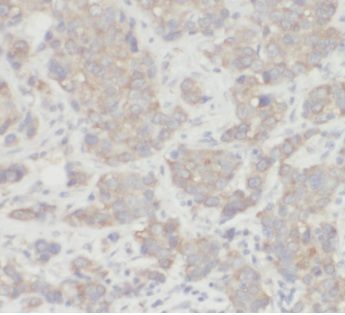FineTest
SKU(재고 관리 코드):FNab00269
anti- AKT1 antibody
anti- AKT1 antibody
Welcome to a world of scientific discovery with our Anti-AKT1 Antibody, available in a convenient 100µg size. This antibody is your essential partner in unraveling the intricacies of the Akt signaling pathway.
The Anti-AKT1 Antibody offers exceptional specificity and sensitivity, making it an ideal choice for a variety of applications, including Western blotting and immunohistochemistry. Its precision in targeting Akt1 ensures reliable and reproducible results in your experiments.
What distinguishes our Anti-AKT1 Antibody is its exceptional performance. It has undergone rigorous testing and validation to ensure that it consistently delivers high-quality results, reducing experimental variability and optimizing resource utilization.
With a 100µg size, this product provides an ideal balance between cost-effectiveness and usability, offering sufficient antibody for multiple experiments while minimizing wastage.
Whether you're a seasoned researcher or just starting in the field, our Anti-AKT1 Antibody is user-friendly and seamlessly integrates into various laboratory techniques, enhancing the precision and reliability of your work.
Empower your research with confidence, knowing you have the support of a meticulously crafted Anti-AKT1 Antibody. Step into the forefront of scientific discovery in cell signaling and cancer biology with this essential tool and contribute to groundbreaking insights in the field.
Product Name
AKT1 antibody
Size
100µg
Form
liquid
Purification
Immunogen affinity purified
Purity
≥95% as determined by SDS-PAGE
Host
Rabbit
Clonality
polyclonal
Isotype
IgG
Storage
PBS with 0.02% sodium azide and 50% glycerol pH 7.3, -20℃ for 12 months(Avoid repeated freeze / thaw cycles.)
BACKGROUND
AKT1 is one of 3 closely related serine/threonine-protein kinases(AKT1, AKT2 and AKT3) called the AKT kinase, and which regulate many processes including metabolism, proliferation, cell survival, growth and angiogenesis. This is mediated through serine and/or threonine phosphorylation of a range of downstream substrates. Over 100 substrate candidates have been reported so far, but for most of them, no isoform specificity has been reported. AKT is responsible of the regulation of glucose uptake by mediating insulin-induced translocation of the SLC2A4/GLUT4 glucose transporter to the cell surface. Phosphorylation of PTPN1 at 'Ser-50' negatively modulates its phosphatase activity preventing dephosphorylation of the insulin receptor and the attenuation of insulin signaling. Phosphorylation of TBC1D4 triggers the binding of this effector to inhibitory 14-3-3 proteins, which is required for insulin-stimulated glucose transport. AKT regulates also the storage of glucose in the form of glycogen by phosphorylating GSK3A at 'Ser-21' and GSK3B at 'Ser-9', resulting in inhibition of its kinase activity. Phosphorylation of GSK3 isoforms by AKT is also thought to be one mechanism by which cell proliferation is driven. AKT regulates also cell survival via the phosphorylation of MAP3K5(apoptosis signal-related kinase). Phosphorylation of 'Ser-83' decreases MAP3K5 kinase activity stimulated by oxidative stress and thereby prevents apoptosis. AKT mediates insulin-stimulated protein synthesis by phosphorylating TSC2 at 'Ser-939' and 'Thr-1462', thereby activating mTORC1 signaling and leading to both phosphorylation of 4E-BP1 and in activation of RPS6KB1. AKT is involved in the phosphorylation of members of the FOXO factors(Forkhead family of transcription factors), leading to binding of 14-3-3 proteins and cytoplasmic localization. In particular, FOXO1 is phosphorylated at 'Thr-24', 'Ser-256' and 'Ser-319'. FOXO3 and FOXO4 are phosphorylated on equivalent sites. AKT has an important role in the regulation of NF-kappa-B-dependent gene transcription and positively regulates the activity of CREB1(cyclic AMP(cAMP)-response element binding protein). The phosphorylation of CREB1 induces the binding of accessory proteins that are necessary for the transcription of pro-survival genes such as BCL2 and MCL1. AKT phosphorylates 'Ser-454' on ATP citrate lyase(ACLY), thereby potentially regulating ACLY activity and fatty acid synthesis. Activates the 3B isoform of cyclic nucleotide phosphodiesterase(PDE3B) via phosphorylation of 'Ser-273', resulting in reduced cyclic AMP levels and inhibition of lipolysis. Phosphorylates PIKFYVE on 'Ser-318', which results in increased PI(3)P-5 activity. The Rho GTPase-activating protein DLC1 is another substrate and its phosphorylation is implicated in the regulation cell proliferation and cell growth. AKT plays a role as key modulator of the AKT-mTOR signaling pathway controlling the tempo of the process of newborn neurons integration during adult neurogenesis, including correct neuron positioning, dendritic development and synapse formation. Signals downstream of phosphatidylinositol 3-kinase(PI(3)K) to mediate the effects of various growth factors such as platelet-derived growth factor(PDGF), epidermal growth factor(EGF), insulin and insulin-like growth factor I(IGF-I). AKT mediates the antiapoptotic effects of IGF-I. Essential for the SPATA13-mediated regulation of cell migration and adhesion assembly and disassembly. May be involved in the regulation of the placental development. Phosphorylates STK4/MST1 at 'Thr-120' and 'Thr-387' leading to inhibition of its: kinase activity, nuclear translocation, autophosphorylation and ability to phosphorylate FOXO3. Phosphorylates STK3/MST2 at 'Thr-117' and 'Thr-384' leading to inhibition of its: cleavage, kinase activity, autophosphorylation at Thr-180, binding to RASSF1 and nuclear translocation. Phosphorylates SRPK2 and enhances its kinase activity towards SRSF2 and ACIN1 and promotes its nuclear translocation. Phosphorylates RAF1 at 'Ser-259' and negatively regulates its activity. Phosphorylation of BAD stimulates its pro-apoptotic activity. Phosphorylates KAT6A at 'Thr-369' and this phosphorylation inhibits the interaction of KAT6A with PML and negatively regulates its acetylation activity towards p53/TP53. AKT1-specific substrates have been recently identified, including palladin(PALLD), which phosphorylation modulates cytoskeletal organization and cell motility; prohibitin(PHB), playing an important role in cell metabolism and proliferation; and CDKN1A, for which phosphorylation at 'Thr-145' induces its release from CDK2 and cytoplasmic relocalization. These recent findings indicate that the AKT1 isoform has a more specific role in cell motility and proliferation. Phosphorylates CLK2 thereby controlling cell survival to ionizing radiation.
IMMUNOGEN INFORMATION
Immunogen
v-akt murine thymoma viral oncogene homolog 1
Synonyms
AKT, AKT1, PKB, PKB ALPHA, PRKBA, Protein kinase B, Proto oncogene c Akt, RAC, RAC ALPHA, RAC PK alpha
Observed MW
62 kDa
APPLICATION
Tested Application
ELISA, IHC, WB, IF
Recommended Dilution
WB: 1:200-1:2000; IHC: 1:20-1:200; IF: 1:10-1:100
UNIPROT INFORMATION
UniProt ID
IMAGES


Share


